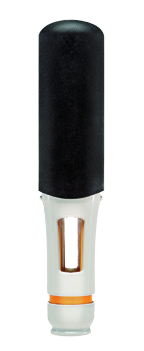Important Safety Information
Indications and Clinical Use:
Rheumatoid arthritis (RA):
PrCIMZIA® (certolizumab pegol) in combination with
methotrexate (MTX) is indicated for:
-
reducing signs and symptoms, including major clinical response, and reducing
the progression of joint damage as assessed by X-ray, in adult patients with
moderately to severely active rheumatoid arthritis (RA)
CIMZIA® may be used alone for reducing signs and symptoms in adult
patients with moderately to severely active rheumatoid arthritis (RA) who do not
tolerate MTX.
Psoriatic arthritis (PsA):
CIMZIA® alone or in combination with MTX is indicated for:
-
reducing signs and symptoms and inhibiting the progression of structural
damage as assessed by X-ray, in adult patients with moderately to severely
active psoriatic arthritis (PsA) who have failed one or more disease-modifying
anti-rheumatic drugs (DMARDs)
Ankylosing spondylitis (AS):
CIMZIA® is indicated for:
-
reducing signs and symptoms in adult patients with active ankylosing
spondylitis (AS) who have had an inadequate response to conventional therapy
Non-radiographic axial
spondyloarthritis (nr-axSpA):
CIMZIA® is indicated for:
-
he treatment of adults with severe active non-radiographic axial
spondyloarthritis with objective signs of inflammation as indicated by elevated
C-reactive protein (CRP) and/or magnetic resonance imaging (MRI) evidence who
have had an inadequate response to, or are intolerant to nonsteroidal
anti-inflammatory drugs (NSAIDs)
Plaque psoriasis (PsO):
CIMZIA® is indicated for:
-
the treatment of adult patients with moderate to severe plaque psoriasis who
are candidates for systemic therapy
Geriatrics (≥65 years of age): Specific clinical studies have
not been performed in elderly subjects.
Pediatrics (<18 years of age): Safety and efficacy of
CIMZIA® in pediatric patients have not been established.
Contraindications:
-
Hypersensitivity to CIMZIA® (certolizumab pegol) or any of its
components
-
Active tuberculosis or other severe infections such as sepsis, abscesses and
opportunistic infections
-
Moderate to severe heart failure (NYHA Class III/IV)
Most Serious Warnings and Precautions:
Serious infections: serious infections, sepsis, tuberculosis
(including military disseminated and extrapulmonary disease), invasive fungal
infections (such as histoplasmosis) and other opportunistic infections, some of
which have been fatal, have been reported in patients receiving TNF blocking
agents including CIMZIA®. Many of these occurred in patients on
concomitant immunosuppressive therapy that, in addition to their underlying
disease, could predispose them to infections. CIMZIA® should not be
given to patients with a clinically important infection including chronic or
localized infections. Physicians should exercise caution when considering the
use of CIMZIA® in patients with a history of recurring infection.
Patients should be monitored for signs and symptoms of infection while on and
after treatment with CIMZIA®.
Any new infection that develops while on CIMZIA®, or after recent
treatment, should be closely monitored. CIMZIA® should be
discontinued if a patient develops a serious infection.
Malignancy: lymphoma and other malignancies, some fatal, have
been reported in children and adolescent patients treated with TNF blockers, of
which CIMZIA® is a member. CIMZIA® is not indicated for
use in pediatric patients.
Other Relevant Warnings and Precautions:
- Worsening congestive heart failure (CHF) and new onset CHF
- Hepatitis B virus reactivation
- Hematological reactions: pancytopenia (including aplastic anemia); cytopenia
(leukopenia, pancytopenia, thrombocytopenia)
- Neurologic reactions (new onset or exacerbation of CNS demyelinating disease,
including multiple sclerosis and PNS demyelinating disease, including
Guillain-Barré syndrome)
- Use in combination with other biologic medicines is not recommended
- Patients in surgery and those being switched to another biologic DMARD should
be closely monitored for infections
- Hypersensitivity symptoms: angioedema, dyspnea, hypotension, rash, serum
sickness, urticaria, dizziness, hot flushes, pulmonary burning sensation, and
throat/uvula swelling
- Latex sensitivity
- Formation of autoantibodies
- Administration of live or live-attenuated vaccines is not recommended
- Use in patients with severe immunosuppression
- May cause erroneously elevated activated partial thromboplastin time (aPTT)
assay results in patients without coagulation abnormalities
- Women of childbearing potential and pregnant women: occurrence of major
congenital malformations and miscarriages was no greater than the background
occurrence of major congenital malformations and miscarriages in the general
population. CIMZIA® should be used in pregnancy only if clearly needed
- May be considered during breastfeeding
For More Information:
Consult the product monograph at https://www.ucb-canada.ca/en/Our-Medicines/overview
for important information relating to adverse reactions, drug interactions, and
dosing information which have not been discussed here.
The product monograph is also available through Medical Information Services at
1-866-709-8444.
